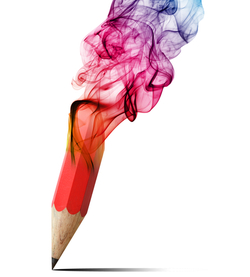When I got into book publishing I was an inexperienced 23-year-old whose previous work experience was waitressing and a couple of cherry college internships that had nothing to do with publishing. I worked my way up the ranks, learning publishing and how to edit books. I've made plenty of mistakes along the way--the kind that sting but make you better at what you do. Coming up in traditional publishing taught me that Chicago Manual of Style is our Bible, that good copyeditors are worth their weight in gold, and that every book, even the best edited books, get published with some typos.
I've spent the last 17 years in one of the most subjective industries around. Sometimes I love this subjectivity. I love that book publishing is creative, and that one person's cup of tea can vary quite a bit from another's. But I've also been part of a sea change in the industry in these past nearly two decades in which we've seen book publishing go from an endeavor reserved for the elite few to something anyone can do. The rise of self-publishing has made editors all the more indispensable, frankly, but it's also created a world in which anyone can publish unedited work, and in which anyone can--and does--call themselves an editor.
A old client of mine recently reached out to inform me that she'd shared her manuscript with an editor who told her it needed another edit. Conveniently, this editor was available for the job. This scenario plays out from time to time, and depending on the author and the editor in question, I've sometimes felt guilty or wrong in such moments, and other times angry and defensive. Today I'm seasoned enough that I feel more confident than I used to about how publish-ready a project I've worked on might be. In this case I knew the book was solid, so instead of getting upset, I got contemplative. Turning inward, musing on these many years of editing, confessions started to bubble to the surface:
Confession: I practically rewrote a book it was so badly executed in its early drafts. It was a popular subject, covering taboo ground and very explicit in some chapters. I tried to salvage it as best I could, but in the end allowed it to be published, knowing it wasn't an A+ effort. This book ended up being the most award-winning book I ever worked on.
Takeaway: A book's success is sometimes driven by the subject matter and not how excellent or A+ the writing is.
Confession: I distrusted my own judgment about a manuscript I truly loved. I allowed another less experienced editor to do an assessment of it because the author wanted a second opinion. To this day I believe the assessment was off, and too critical. I shared it with the author anyway, believing I'd gotten too close to her. She was devastated and put the book aside indefinitely.
Takeaway: Editors are human. We can get too close to our authors, and readers vary in what they like. A critical assessment may have to do with your execution, or it may stem from an editor not jiving with your subject, your voice, or your style.
Confession: I had a client who was so concerned about money that I felt the strain of this every time we met. In trying to save her money, I inadvertently created more work for her, and ultimately counteracted whatever savings I thought I was securing when she ended up having to get a second edit because the first one I lined up for her was actually a proofread, and too light, and she got critical feedback from her beta readers about the status of the manuscript after that first editorial pass.
Takeaway: Editors sometimes get emotionally entwined, and can take on the burden of their client-authors. If you sense a strategy that seems like it's cutting corners, ask about the potential fallout.
Confession: I've worked with authors to midwife their books, putting them through a rigorous developmental process, only to come out the other side knowing that the manuscript we've just birthed is less than it could be. On occasion I've tried to push an author past the limits of what they can do, but this is an exercise in futility. Sometimes a book needs to come into the world in all its imperfection, and both the author and the editor need to let it be good enough. I've edited "good enough" books, and I've learned from experience that these books find their way, and their audiences.
Takeaway: There's room in publishing for masters and apprentices, as long as both subject themselves to good editing. You cannot write your magnum opus as your first effort. It's something all authors build toward. Publish along the way.
Confession: As much as I'm a populist and a champion of indie authors, I'm not a champion of editors who come to their profession because they like to read, or just because they wrote a book. Good editors are hard to find, and honestly good copyeditors and proofreaders even more so. I'm always shocked to see a book I've developmentally edited come back from the copyeditor marked up for grammar. At any stage, the likelihood of editors missing something or a few things is basically 100%. Put your faith in us, but don't treat us like gods.
Takeaway: Never let your book go to the printer without reading it one more time all the way through, no matter how painful this might be. And enroll friends or beta readers at the very last stage, asking people to read through to catch typos only. And when they do, remember the part about editors not being gods. Publishing well is a collaborative effort, and anyone who tells you otherwise is not being collaborative.

